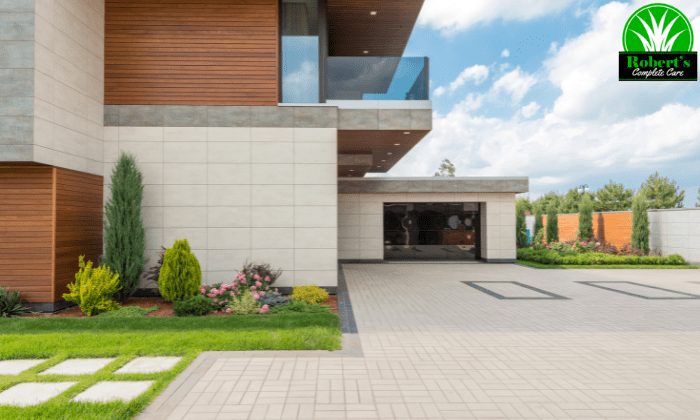- (562) 208-0148
- robertscompletecare@hotmail.com
Concrete Driveway Installation by Robert's Complete Care

Concrete driveway installation is essential to any property, providing a safe and convenient place to park vehicles. A concrete driveway is a durable and long-lasting option, and Robert Complete Care is a trusted provider of concrete driveway installation services. In this article, we’ll take a closer look at the company’s concrete driveway installation services and the pros and cons of crushed concrete driveways.
Concrete Driveway Installation
A concrete driveway is popular for homeowners due to its durability and low maintenance requirements. Robert Complete Care offers various concrete driveway installation services, including custom design, site preparation, and concrete pouring and finishing.
Their experts work closely with each homeowner to design a concrete driveway that meets their needs and preferences. They assess the property’s landscape, parking needs, and style preferences before creating a custom design that complements its architecture and landscaping.
Site preparation is a critical part of the concrete driveway installation process, and Robert Complete Care takes great care to ensure that the site is correctly prepared before pouring the concrete. They remove any existing driveway or landscaping, grade the site to ensure proper drainage, and install necessary drainage systems.
Concrete pouring and finishing is the final stage of the installation process. Robert Complete Care uses high-quality concrete and advanced techniques to ensure the concrete is poured and finished to the highest standards. They apply a sealant to protect the concrete from moisture and help prevent cracking and staining. so if you want satisfactory concrete driveway installation you can contact us.
Concrete Driveway Sealer
Concrete driveway sealer is a key ingredient in keeping your driveway looking pristine and new. Not only does it protect the surface from the elements, but it also helps to keep the concrete looking its best for years to come. There are a variety of types of sealers available on the market, so be sure to choose one that is specifically designed for concrete. Some sealers are water-based while others are oil-based. It is important to research which type of sealer will work best for your specific driveway situation.
Once you have selected a sealer, be sure to apply it according to the manufacturer’s instructions. Be sure to wear gloves and avoid getting any product on your skin or clothes. Once applied, leave the sealer to dry before walking on the driveway. If you notice any signs of wear or deterioration, be sure to re-apply the sealer as necessary. By following these simple steps, you can keep your driveway looking new and pristine for years to come!
Crushed Concrete Driveway Pros and Cons
In addition to traditional concrete driveways, crushed concrete driveways have become increasingly popular. Crushed concrete is a recycled material created by crushing and sorting old concrete. Here are some of the pros and cons of crushed concrete driveways:
Pros:
- Eco-friendly: Crushed concrete is a recycled material, making it an environmentally friendly option.
- Affordable: Crushed concrete is typically less expensive than traditional concrete.
- Low maintenance: Crushed concrete driveways require little maintenance beyond occasional grading and weed control.
Cons:
- Durability: Crushed concrete driveways may not be as durable as traditional concrete driveways and may require more frequent repairs.
- Drainage: Crushed concrete driveways may provide better drainage than traditional ones, leading to standing water and potential damage.
- Appearance: Crushed concrete driveways may not have the same aesthetic appeal as traditional concrete driveways and may not complement certain architectural styles.
Asphalt Vs Concrete Driveway
Asphalt vs Concrete Driveways – The Debate When it comes to driveway options, many homeowners are faced with the choice between asphalt and concrete. While both materials have their benefits, which one is right for your home?
- Asphalt driveways are generally cheaper to install than stamped concrete driveways, and they’re also more durable. However, they can be less flexible than concrete driveways, which may be a problem if you need to make changes to your driveway in the future.
- Additionally, asphalt can become cracked or damaged over time if it’s not treated properly. Concrete driveways are more expensive to install, but they’re also much more resistant to wear and tear.
- They may be unable to accommodate certain types of vehicles, however, so be sure to test out a few different models before making a decision. In addition, depending on the type of cement used, a concrete driveway may emit some chemical smells over time.
Sealing Concrete Driveway
Sealing concrete driveways is an important step in protecting them from weathering and staining. Over time, the elements can cause the surface of the driveway to crack, peel, and even crumble. Sealing the asphalt layer also protects it from moisture and debris that can damage the underlying concrete. There are a few different types of sealants available for use on stamped concrete driveways.
- The most common is an epoxy sealant, which is a three-step process that begins with applying a base coat to the driveway. This will help to prevent fading and cracking while providing a tough surface for the sealant to adhere to.
- Next, an epoxy topcoat is applied, followed by a final protective coat of varnish or paint. All three coats must be fully cured before driving on the driveway. If left uncoated, rainwater and other contaminants can seep under the surface and cause damage over time.
- Once sealed, epoxy sealants are extremely durable and resistant to most chemicals and solvents. However, they should not be left unprotected in direct sunlight or near heat sources like fireplaces or grills – both of which can cause them to fail prematurely.
Concrete Driveway Crack Repair
Concrete driveways can be a very important part of any home, and can often last for many years without any issues. However, over time, cracks can form in the concrete due to various factors. If you notice a crack in your driveway that is getting bigger, or if it seems to be developing into a larger problem, there are a few steps you can take to try and repair it.
- First, you’ll want to try and determine the cause of the crack. This may involve reviewing footage of the area before and after the crack developed, looking for any changes in weather conditions or construction nearby that might have caused it, or simply talking to those who have used the driveway in the past. Once you know what’s causing the damage, you can start working on finding a solution.
- One option is to seal off the crack with a temporary fix using epoxy or another type of adhesive. This will prevent further damage from occurring while you work on finding an permanent solution.
- If sealing isn’t an option for some reason, then you might need to replace parts of the concrete driveway that are cracked or damaged. This could involve replacing entire sections of pavement, or just repairing individual cracks. whichever option is necessary will depend on how badly the crack has deteriorated and what kind of materials are available locally.
Regardless of what step is ultimately needed, taking steps to repair a stamped concrete driveway crack is always best prevention strategy. By addressing the issue early on, you can avoid more
Conclusion
A concrete driveway is an excellent choice for homeowners looking for a durable, low-maintenance option. Robert Complete Care is a trusted provider of concrete driveway installation services, offering custom design, site preparation, and concrete pouring and finishing. Contact Robert Complete Care for expert advice and high-quality service if you’re considering a concrete driveway installation.
Additionally, crushed concrete driveways offer a more affordable and eco-friendly option, but they may need to be more durable and aesthetically pleasing than traditional concrete driveways. Consider the pros and cons carefully before making your decision, and consult with a professional to ensure that you choose the right option for your specific needs.

